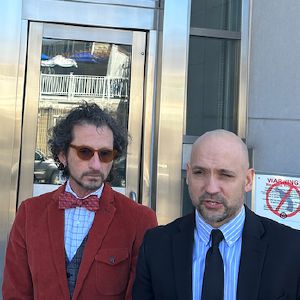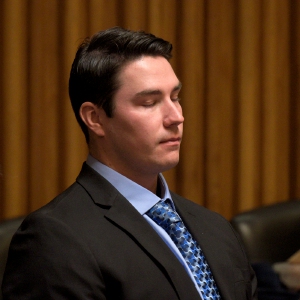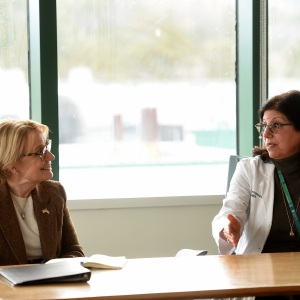Column: Health equity research at risk of losing funding
| Published: 03-04-2025 2:30 PM |
Scientific research advances knowledge, knowledge is power, and as a result there has been and likely always will be politicization of science by those in power. For years, politicians have made it difficult or impossible to conduct research on gun violence or climate change.
Most recently, another area of study that has come under fire is health equity research. This multidisciplinary field is devoted to gaining scientific knowledge about the complex factors that influence health by identifying, explaining and addressing modifiable and unjust differences across groups; understanding the roles of mechanisms and societal factors that underlie health disparities; and developing, evaluating and scaling interventions to reduce or eliminate adverse health outcomes.
I am an associate professor at the Geisel School of Medicine at Dartmouth and my research program studies how access to multidisciplinary cancer care influences patient outcomes. Being located at one of the only rural NCI-designated cancer centers in the country, I am particularly interested in studying access to cancer care among rural populations. There is rigorous evidence that documents disparities in health care access, quality and health outcomes by sociodemographic, socioeconomic and geographic factors.
However, due to the Trump administration’s targeting of DEI programs, scientific researchers are now concerned that even acknowledging health disparities in grant proposals will result in the project being flagged by this administration as not being aligned with their priorities. Following a report from The New York Times on Feb. 9, there has been crowdsourcing of information within the scientific community on grants being flagged for including “DEI language,” which includes terms like “equity,” “advocacy” and “underserved.”
A project that I am collaborating on with investigators across the country received a fundable score after a rigorous peer review process, but the NIH advisory council meeting that would have provided final funding decisions was canceled, and now we are concerned the project might not be funded because it involved studying drivers of health disparities in a pediatric population. Apparently, this is not aligned with our national priorities.
Research on health equity is a crucial component to scientific research because it ensures that medical innovations and health care improvements benefit all communities. Further, it makes for compelling lines of inquiry. That’s because uncovering differences in outcomes across subgroups of individuals naturally raises questions. First, what are the factors that contribute to the differences in outcomes? Conceptual models demonstrate how multiple levels of factors (individual, family, neighborhood, health system and state factors) can contribute to disparities in health outcomes, and researchers use these models to develop specific hypotheses to test in their analytic plans.
Once we understand which factors are contributing to the differences in outcomes, the next question is to sort out which of those factors are modifiable. By modifiable, we mean, which can we target through changes in policy or practice? This question often involves innovations and interventions that are then evaluated using a range of study designs, and importantly, lead to general knowledge on how health care can be improved for all.
One example of how an initial observation of a health disparity led to generalizable evidence for an effective intervention is patient navigation in cancer care. The origin of patient navigation in cancer care dates back to 1990, when Dr. Harold Freeman was shocked that the overwhelming majority of patients in the Harlem community where he practiced were presenting with late-stage breast cancer. A contributing factor to a diagnosis of late-stage breast cancer is limited access to cancer screening. To address this barrier, Dr. Freeman initiated an intervention that included two components: providing free or low-cost mammograms for earlier detection and integrating “patient navigators” within the care team, who worked closely with patients to support their concrete needs (financial barriers, communication) and ensuring prompt follow-up.
Article continues after...
Yesterday's Most Read Articles
 Federal judge temporarily reinstates legal status for Dartmouth graduate student
Federal judge temporarily reinstates legal status for Dartmouth graduate student
 Prosecutors seek prison term of at least 30 years for man convicted at Dartmouth rape trial
Prosecutors seek prison term of at least 30 years for man convicted at Dartmouth rape trial
 Former Dartmouth ski team member dies in accident in California
Former Dartmouth ski team member dies in accident in California
 West Lebanon bridge reopens to vehicles
West Lebanon bridge reopens to vehicles
 Upper Valley donut maven Muriel Maville dies at 87
Upper Valley donut maven Muriel Maville dies at 87
The program’s success, which improved breast cancer five-year survival rate in the Harlem community from 39% to 70%, caught the attention of the federal government. Congress signed the Patient Navigator and Chronic Disease Prevention Act (HR1812) into law in 2005, which enabled the government to fund awards to eligible institutions for delivery of patient navigation services.
Since then, patient navigation programs have been gaining momentum and recognition in the United States. By 2012, The American College of Surgeons Commission on Cancer required all Commission on Cancer-accredited organizations to have a patient navigation program, which applied to over 1,000 hospitals responsible for treating approximately 70% of incident cancer cases and includes Dartmouth Cancer Center.
However, these programs were primarily funded through short-term grants or institutional funds. Advocacy for patient navigation integration within reimbursement structures for all Medicare beneficiaries culminated in January 2024 when CMS announced two new billing codes for Principal Illness Navigation that health systems can use to request reimbursement for patient navigation services. Patients diagnosed with cancer who receive treatment at Dartmouth Cancer Center have access to patient navigators to help them overcome barriers to care because of an initial observation of a health disparity in Harlem in the 1990s and all of the research and advocacy that followed.
This is one example of many, and I am one researcher of many who might be negatively impacted by this administration’s attacks on scientific research. My hopes are that the checks and balances in our government hold, that our academic institutions mount a strong and collective resistance, and that the American people do not suffer the consequences of a national divestment in knowledge for the sake of one man’s power.
Erika Moen lives in West Lebanon.






 Editorial: New Hampshire budget shortfall is a crisis of Republican design
Editorial: New Hampshire budget shortfall is a crisis of Republican design Editorial: Time is running out for American democracy
Editorial: Time is running out for American democracy Editorial: Jeanne Shaheen blazed a trail in politics
Editorial: Jeanne Shaheen blazed a trail in politics Column: Federal funding for medical research puts America first
Column: Federal funding for medical research puts America first
